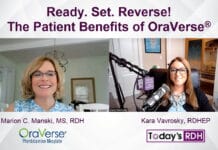Independence. From the time a baby takes those first, wobbly, independent steps, to nations fighting wars over freedom and independence, the “i” word frequently invokes both positive and negative heightened emotional responses from us.
Even so with dentistry! For instance, what comes to mind when you hear the phrase independent contractor or independent hygienist? Confusion? Pride? Happiness? Even anger? These initial emotions are influenced by our own past experiences, personal research, opinions, and—let’s not forget—the fear of judgment by those around us.
From time to time it is important to take a step back and review precisely what it means to be an independent dental hygienist. The first thing to note is that the phrase independent dental hygienist has had many connotations throughout the years, but is actually now rather antiquated. Instead, the American Dental Hygienists’ Association has coined a new and preferred phrase: direct access.
The American Dental Hygienists’ Association (ADHA) defines direct access as the ability of a dental hygienist to initiate treatment based on their assessment of a patient’s needs without the specific authorization of a dentist, treat the patient without the presence of a dentist, and maintain a provider-patient relationship. https://www.adha.org/resources-docs/7513_Direct_Access_to_Care_from_DH.pdf
Currently, at least 42 states allow dental hygienists to provide direct access to care. While some states permit completely independent hygiene practice, most still require some form of supervision from a dentist. While common, it is important to note direct access dental hygienists are not always limited to serving public health communities; instead, they often provide mobile care and do so in schools, universities, corporate locations, patient homes, or long-term care facilities.
To help redefine our individual viewpoints, let’s take a minute to address a few myths about what it means to be a direct access dental hygienist in 2018:
1) My state doesn’t allow me to practice independently
While this may have been true 20 years ago, the fact is that most states actually do allow dental hygienists to provide some services without the onsite presence of a dentist. You may need to meet certain qualifications, need to have a written agreement with a dentist, or have limitations on where you can practice and to whom you can treat, but the fact is you probably can provide direct care. Even in states that don’t allow direct access to clinical services—like Delaware and North Carolina—there are still ways to use your dental hygiene degree outside of the traditional practice setting. For instance, you may be able to provide oral health education to students in schools or assisted living facilities. You may also be able to organize a community oral health drive and donate toothbrushes and toothpaste to a local shelter.
2) An independent practice dental hygienist is the same as a dental therapist
This myth is usually a result from unfamiliarity with the various dental therapy models currently active within the United States. The truth is that dental therapists cannot provide subgingival scaling and other hygiene services unless the dental therapist also has a dental hygiene license. With the exception of the Alaskan Dental Health Aide Therapist (DHAT), most dental therapy models do require dental therapists to hold a dental hygiene license simultaneously. As more and more dental therapy models are being discussed, it is important to recognize that rules and regulations will vary from state to state.
3) All dental hygienists want to become independent
This myth is usually propagated by dentists and others who are not hygienists. The reality is that the majority of hygienists are satisfied with their current roles and aren’t interested in providing direct services. While there is a small percentage of the workforce who see the value of providing such care, most hygienists are comfortable with their current career path.
4) I can make more money as an independent dental hygienist
Any hygienist who provides direct services—independent or not—will tell you this is not necessarily true. This is, in part, due to the many restrictions from states and insurance companies alike—things like limiting direct services to public health settings or not allowing reimbursement to the hygienist. Even hygienists who own dental practices often initially find it difficult to make a profit due to the large overhead required and low reimbursement rates.
5) Independent dental hygienists just want to become dentists
I can’t help but shake my head when I hear people say this! Yes, a very small percentage of dental hygienists really just want to be a dentist. Those that can, ultimately do. Most dental hygienists who pursue independence do so for reasons like yearning to be their own boss or to find ways to improve the current healthcare delivery system. Those that pursue the path to direct care should be prepared to embark on a long, arduous journey with frequent uphill battles. In my experience, hygienists that choose this path are usually those empathetic, passionate, and hardworking individuals who earnestly believe they can do more to help improve the lives of those around them.
Out with the old, in with the new! The phrase independent dental hygienist may always conjure up strong emotions from some, but let’s do our profession a favor and support our colleagues who yearn to provide direct services. The first place to start is by redefining our own personal view of direct access and then also by helping educate those around us too!
SEE ALSO: Dental Hygienists and the Business of Dentistry
DON’T MISS: 5 Non-Traditional Career Opportunities for Dental Hygienists











